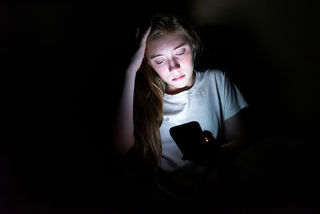 More than 80 percent of teenagers now have smartphones in the U.S. In fact, half of all U.S. youth get their own personal phone by age 11 – up nearly 20 percentage points from four years ago, according to a national survey.
More than 80 percent of teenagers now have smartphones in the U.S. In fact, half of all U.S. youth get their own personal phone by age 11 – up nearly 20 percentage points from four years ago, according to a national survey.
The authors found that most of the evidence connecting technology use and mental health problems is observational, making it difficult to establish a cause-and-effect relationship. But there are several randomized, controlled studies that show social media and smartphone use may be contributing to mental distress among young people.
First, researchers found evidence that when young people use social media, it affects their sense of self. Surveys of university students in the U.S. and Germany found students who spent more time on Facebook were more likely to feel envious of others and worse about themselves. And a small randomized, controlled study found young women between the ages of 17 and 25 reported a more negative mood after just 10 minutes of browsing Facebook.
A systematic review published in 2017, which is included in the new review article, found that youth who reported high levels of internet use were more likely to harm themselves or engage in suicidal behaviors because connecting with other youth who self-injure can normalize the behavior and encourage it. And another review found that some youth use online platforms to view and discuss self-harm.
On the whole, the review found observational evidence that spending time on social networking sites is associated with depression and suicide among youth, especially young girls. Even when interacting with their peers face-to-face, having a phone out leads young people to feel more distracted and have a worse overall mood.
The data also show that smartphone use affects sleeping patterns among young people. There is solid evidence that having a hand-held electronic device in the bedroom is associated with taking longer to fall asleep, less rapid eye movement sleep (which is essential for rest and health) and reduced levels of alertness the following day.
These are a lot of data to digest at once. But they clearly show that using hand-held devices and interacting on social media apps are having an effect on youth mental health. Understanding how and why is complicated, explained Janis Whitlock, a BCTR research scientist who studies technology and adolescent mental health
“Understanding the complex relationship between smartphone use and mental health is particularly challenging because, not only is this a new frontier, it’s complicated by a number of other significant and likely-to-be-impactful influences,” Whitlock said. “Since it is also clear that that social media can have a positive impact on help seeking and support provision, efforts to understand how to best minimize potential harm and maximize potential benefits are important next steps.”
The takeaway here: We have a lot to learn about the consequences of smartphone use among youth to better understand its impact on mental health as well as other aspects of development. Although the evidence clearly demonstrates reasons to be concerned and mindful, there is also some research that shows technology can serve as a support system for youth.



Speak Your Mind